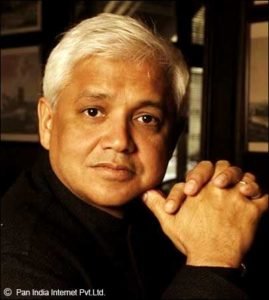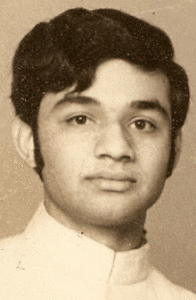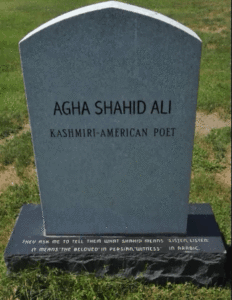The Ghat of the Only World
By Amitav Ghosh

About the Author
Amitav Ghosh has so far been judged as one of the best postmodern writers in the category of Indian Writing in English. He was born on 11th July, 1956 in Calcutta. His father, Lieutenant Colonel Shailendra Chandra Ghosh is a retired Indian army officer. It is because of his father’s posting at different places, Ghosh had the opportunity to travel within and outside the country. Ghosh is married to Deborah Baker who is also a writer. The couple is survived by two children- Lila and Nayan.
Amitav Ghosh was first educated at Doon School. He then graduated from St. Stephen’s college, Delhi. Later he went to St. Edmund Hall, Oxford where he was awarded Ph.D. in Social Anthropology in 1982. In the field of teaching, Ghosh has taught at several places so far. Apart from this, he has been a visiting professor to the Department of English of Harvard University since 2005. Ghosh has also taught at several colleges in Delhi.
As a noted personality in the field of literature, Amitav Ghosh has so far written and published many novels. He published his first book, ‘The Circle of Reason’ in 1986. Amitav Ghosh has been awarded with several prestigious awards for his immense literary output. He has been awarded the Prix Medicis Etrangere, which is a top literary award of France for his novel ‘The Circle of Reason’ in the year 1990. He has been awarded the Padma Shri by the Government of India in 2007 and also elected as a Fellow of the Royal Society of Literature in 2009.
Introduction
1. It is a tribute to the great Kashmiri poet, writer and teacher – Agha Shahid Ali who lived in America and died of brain tumour on 8th December, 2001.
2. It is a serious story about friendship and commitment the writer has to fulfill after the death of his friend – Agha Shahid Ali.
3. It is about his love for Kashmir, his love for food and music and his views on life, art and literature.
Summary in Points
1. Shahid talked to the narrator about his approaching death on 25 April, 2001.
2. He has been under treatment of cancer for about 14 months.
3. The narrator consoled him that he would be fine soon.
4. Shahid wanted the narrator to write something about him. The narrator promised to do so.
5. The narrator had already read Shahid’s ‘The Country Without a post office’.
6. His illness didn’t impede the progress of their friendship.
7. Both of them loved Rogan josh, Roshanara Begum and Kishore Kumar. They also liked old Bombay films and were indifferent to cricket.
8. Although critically ill, Shahid was full of life.
9. He sent the hospital escort away when he tried to help him.
10. Shahid was very social and fond of parties and food.
11. There was always ‘an endless mela of talk, laughter, food, and, of course, poetry’ at his house.
12. Shahid was famous for his skill in the kitchen. He could tell from its smell if Rogan josh was ready or not. He had a passion for the Kashmiri food.
13. Shahid was sharp in repartee.
14. Shahid was a brilliant teacher. He taught at many colleges and universities in the
U.S.A.
15. Shahid hated violence and the counter-violence in Kashmir. Kashmir was the central theme of his poetry.
16. He was secular and believed in the separation of politics and religion.
17. He expressed his wish ‘to go back to Kashmir to die’ but was laid to rest in Northampton. He died peacefully on 8th Dec. 2001 at 2.99 a.m.
Shahid and his family
1. Shahid lived in America with his brother, Iqbal and two sisters, Hena and Sameetah.
2. His parents lived in Srinagar. He spent the summer months with them every year.
His Stay in America
1. Shahid had been staying in Manhattan, New York, USA.
2. Here he had a sudden blackout in February, 2000.
3. He had undergone several tests that revealed that he had a dangerous brain tumour.
4. He decided to move to Brooklyn to be close to his youngest sister Sameetah who was a teacher at the Pratt Institute – a few blocks away from the street where the writer lived.
5. He lived on the seventh floor of a newly-renovated building. His apartment was airy and spacious.
6. There would be always some half-dozen or more people gathered inside – poets, students, writers, relatives and in the kitchen someone would always be cooking or making tea.
7. Till the very end of his life, it was the centre of an endless mela of talk, laughter, food and poetry.
Amitav and Shahid
1. The writer knew Shahid long before he met him. An expatriate from Kashmir who studied in Delhi University.
2. A common friend put him in touch with Shahid. They has several conversations on the phone in 1998 and 1999 and even met a couple of times but they were no more than acquaintances until Shahid moved to Brooklyn.
3. Shahid and the writer were now in the same neighbourhood. Since they had common friends and common tastes, they became good friends.
4. Shahid spoke to the writer the first time about his approaching death on 25th April, 2001. He comforted and consoled him saying that he would be fine. He had to be strong.
5. Amitav realized that Shahid wanted him to remember not by the memory but through the written words.
6. Finally the writer promised to do the best he could. He picked up his pen and started to note down everything he remembered of his conversation to keep his promise.
About Shahid (Value Points only)

1. A man of jovial nature
2. His voice was lyrical and fiercely disciplined.
3. Very social and amiable – many friends in America and India.
4. Great love for the songs of Kishore Kumar and Roshanara Begum, Bombay films, and indifference to Cricket.
5. Loved Television Camera
6. Felt strong and confident despite being very weak
7. Gregarious – fond of the company of others – loved festivity – no time to be depressed
8. He was the great lover of Kashmiri and Bengali food. He could tell from the smell alone, exactly which stage the Rogan Josh had reached.
9. Shahid’s poetry was greatly influenced by James Merrill, a poet who changed the direction of his poetry.
10. He responded sometimes in a poetic way. Once he was stopped by a woman security guard at Barcelona Airport. She asked: ‘What do you do?’ ‘I’m a poet’, Shahid answered. ‘What were you doing in Spain?’ ‘Writing poetry’, Shahid answered. ‘Are you carrying anything that could be dangerous to the other passengers?’ He clapped a hand to his chest and cried: ‘Only my heart
11. He was an amazing teacher. Students spoke a lot about the brilliance of his teaching. He took his last class on 7th may, 2000 at Baruch College, Manhattan. They printed a magazine and dedicated the issue to him.
12. Love for Indian students – When an Indian student walked in late in his class, he greeted her with the cry, ‘Ah my little subcontinental has arrived.’
13. Very sad to see the political situation in Kashmir.
14. A firm believer in the separation of politics and religious practices.
15. In his childhood he desired to create a Hindu Temple in his room in Srinagar. His mother brought him Murtis and other things for conducting Pujas at this shrine.
16. He wished to go back to Kashmir to die but because of logistical and other reasons he changed his mind about returning to Kashmir. He was content to be laid to rest in Northampton.
17. He died peacefully on 8th Dec. 2001 at 2.00 a.m.

Short Answer Type Questions
Q. When and where did Agha Shahid Ali talk of his death?
Ans. Agha Shahid Ali spoke to the narrator about his approaching death on 25 April 2001. The narrator telephoned that he was coming to his apartment to pick him up. They had to go to a friend’s house for lunch. Although they had talked a great deal over the last many weeks, Shahid never touched upon the subject of death.
Q. How do Shahid and the writer react to the knowledge that Shahid is going to die?
Ans. “Oh dear! I can’t see a thing…I hope this doesn’t mean that I am dying,” The fear of death was clearly visible in these words of Shahid. He got scared when he felt for the first time that he was dying. When his occasional memory lapses became more serious with passage of time, the realisation of death drawing nearer becomes stronger. When he was in a conversation with Amitav Ghosh, he said in a clear ringing voice- “When it happens, I hope you will write something for me.” The writer could think of nothing to say on such a topic. At last, he had to promise, “I’ll do the best I can.” From that day, the writer started keeping a record of all the conversations and meetings he had with Shahid. This record helped him to fulfil his promise.
Q. What request did Shahid make to the narrator and what did he say to Shahid?
Ans. The narrator tried to console Shahid that he would be fine again. Shahid ignored his assurance and cut him short. He requested the narrator to write something after his death. The narrator was shocked into silence. But Shahid insisted on extracting a promise. The narrator finally promised to write something after his death.
Q. What common interests did the narrator share with Shahid Ali?
Ans. Love for poetry and literature bound the narrator with Shahid. His work “The country Without a Post Office” made a deep impression on the narrator. They had common friends in Delhi as well as in America. Love for rogan josh, Roshanara Begam and Kishore Kumar further cemented their friendship. Both of them were found of Bombay films and had a mutual indifference of Cricket.
Q. “Shahid’s gregariousness had no limit” Explain?
Ans. Shahid was very social. There was never an evening when there was not a party in his living room. There were always some half dozen or more people gathered inside. They included poets, students, writers and relatives. Someone would always be cooking or making tea in the kitchen. Almost to the very end of his life, he was the centre of an ‘endless mela of talk, laughter, food, and, of course, poetry.
Q. Give an example to show Shahid’s sharpness in repartee.
Ans. Shahid was quite witty. Once a lady security guard at Barcelona airport stopped him. She asked what he was doing in Spain. “writing poetry” he said. Finally the woman asked if he was carrying anything that could be dangerous to the other passengers. Shahid clapped a hand to his chest and cried; “only my heart.”
Q. Give an example to show Aga Shahid Ali’s secular credentials.
Ans. Shahid was secular in his outlook. He remained a firm believer in the separation of religion and politics. His outlook was all inclusive. In his childhood he wanted to create a small Hindu temple in his room in Srinagar. His mother bought him the idols and other things. He hated fanaticism.
Q. What did Amitav feel like when he was asked to write about Shahid?
Ans. Amitav was spellbound for a while. He could think of nothing to say. He didn’t get the words in which one promises a friend that one will write about him after his death.
Q. What do you know about Shahid as a poet?
Ans. Shahid’s most celebrated work is The Country without a Post Office, published in 1997. The Country Without a Post Office, had made a powerful impression on his readers. His voice was unique – at once lyrical and fiercely disciplined. His was a voice that was not ashamed to speak in a bardic register.
Q. What fed and strengthened their friendship?
Ans. Once staying in Brooklin, in Shahid’s neighborhood, Amitav soon discovered that the two of them had a great deal in common. By this time of course Shahid’s condition was already serious, yet his illness did not impede the progress of their friendship. They had a huge roster of common friends, in India, America, and elsewhere. They discovered a shared love of rogan josh, Roshanara Begum and Kishore Kumar; a mutual indifference to cricket and an equal attachment to old Bombay films.
Q. Shahid had a sorcerer’s ability to transmute/change the mundane/ordinary into the magical. What incident does the author quote to explain this?
Ans. Once Amitav Ghosh happened to accompany Iqbal, Shahid’s brother, and Hena, his sister, on a trip to fetch him home from hospital. By that time Shahid had already been through several unsuccessful operations. Now he was back in hospital to undergo a surgical procedure that was intended to relieve the pressure on his brain. His head was shaved and the shape of the tumour was visible upon his bare scalp, its edges outlined by metal stitches. When it was time to leave the ward a blue-uniformed hospital escort arrived with a wheelchair. Shahid waved him away, declaring that he was strong enough to walk out of the hospital on his own.
Q. What impressions of Shahid do you gather from the piece?
Ans. Shahid Ali was a multi-faceted personality and appears to be a sensitive soul. He was born in Srinagar and had studied in Delhi. Later, he migrated to America and served in various colleges and universities. Shahid was a fine scholar and and a brilliant teacher. His students loved and respected him. Sahid was a profound lover of good poetry, music, clothes and food. He always thought of Kashmir and was hurt by the mounting violence in the valley. Though he was not a political poet, his finest work relates to writing about Kashmir. Shahid outlook was ecumenical. He did not believe in mixing of politics and religion. He never lost the courage in the face of misfortune. Even dreadful disease of cancer could not break his spirit. He refused to take the help of the wheelchair in the hospital.
Q. Look up the dictionary for the meaning of the word ‘diaspora’. What do you understand of the Indian diaspora from this piece?
Ans. The term diaspora comes from an ancient Greek word meaning “to scatter about.” The Bible refers to the Diaspora of Jews exiled from Israel by the Babylonians. It means the dispersion or spread of any people from their original homeland.
From this text, we come to know that a number of Indians have settled in different countries of the West, especially England and America. Agha Shahid, his brother and two sisters, Suketu Mehta and the writer form part of the Indian diaspora in America. Shahid belonged to Kashmir and migrated to America in 1975. his elder brother was already settled there. His two sisters also joined them later. These people, though living in another land, never forgot about their roots. These Indians feel a sense of unity and keep meeting each other on various occasions.
Author says in his Blog

A few years ago, I don’t know exactly when, my essay on the Kashmiri poet Agha Shahid Ali was included in a textbook that is read by millions of school children in India. Since then I’ve received many letters and messages about Shahid through my website. One of the most touching of these was sent to me a few days ago by Shreya Jain, a Delhi teenager. Her message included two poems dedicated to Shahid. My correspondence with Shreya is posted below:
|
Thank you so much sir, I just wanted to ask another thing, do you have an idea why exactly Shahid changed his mind about going to Kashmir just before his death? Yours truly Dear Shreya It’s interesting that you ask that. In the last phase of his life Shahid felt very much rooted in America, which was only natural since he had lived in the US a long time and was moreover, a deeply and widely loved figure in American literary circles. A few months before he died he took US citizenship. He once told me a funny story about his citizenship interview. At one point the interviewer asked him whether he would be willing to take up arms against his former country if it ever became necessary. This was of course an absurd question, not only because Shahid was the gentlest and most peaceable of people, but also because he was terminally ill at the time. ‘So what did you say?’ I asked. Shahid burst into laughter: ‘What could I say?’ I gave him a big smile and said: ‘Oh yes!’ On another occasion he mentioned to me that he wanted to be buried near Emily Dickinson, who was one of the poets he most loved. She is buried in Amherst, Massachusetts, and Shahid’s grave is just a short distance away, in Northampton. All the best Amitav |
Image Reference: amitavghosh.com
en.wikipedia.org

Shahid was a jocular person but don’t you think sir that deep inside he had kept all his pain for only himself?
Well, isn’t that what every jocular and full-of-life-person does?
He always surrounded himself with people and loved parties so that he won’t get the time to dwell upon the pains of his life.
I just wanted to another question? What does the writer say about sahid illness?
Very useful nd easy to understand..thanks for this material….
Very useful notes. Thanks
Well thanks for the notes but i just noticed the words on his grave. Kashmiri american and not indian american.
Thanks.. The content was really very useful
Very nice study notes. I find these notes greatly helpful to me.
Thank you. It’s Very helpful
I just wanted to another question? What does the writer say about sahid illness?
Thank you. It’s Very helpful
Thanks.. The content was so helpful to me during exams
Plz …clear me the topic HIS STAY IN AMERICA…. Point number 5
Sorry … point number 4
Really sir it was so help to know the gist of the full story in just a go.
Thank you monsieur
Very nice notes about The Ghat of The Only World. Thank you.
what is the theme of lesson ?
Please correct the time it is written 2:99pm . Kindly correct it. And the summary was fabulous